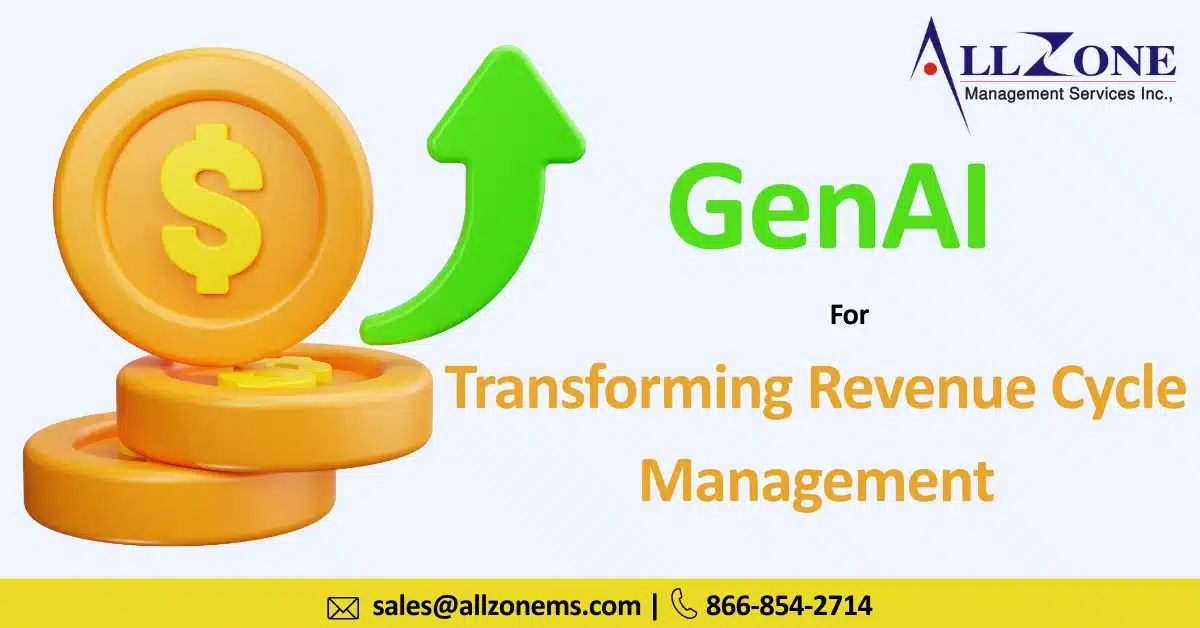Generative AI is revolutionizing healthcare: Recent breakthroughs have seen these models excel in medical exams, complex diagnoses, and even pandemic response strategies. Advanced language models like GPT-4, Google’s Bard, and specialized healthcare models are now capable of handling intricate tasks that can dramatically improve clinical decision-making and administrative efficiency.
The immense potential of Generative AI in healthcare is reflected in the projected market value of USD 22.1 billion by 2032, driven by its ability to enhance diagnostics, simulate patient conditions, and optimize data for research and development.
Revenue Cycle Management (RCM):
Revenue Cycle Management (RCM) is a prime example of how Generative AI can transform healthcare operations. This complex process, encompassing everything from patient payments to reimbursements, has been increasingly burdened by regulatory changes, data overload, and evolving payment models.
GenAI offers a solution by efficiently managing and analyzing vast amounts of unstructured data, including clinical notes, insurance claims, and medical images.
RCM: A Prime Target for Generative AI Transformation
Beyond basic tasks like note-taking and summarizing, GenAI is poised to revolutionize Revenue Cycle Management (RCM). By rapidly processing immense volumes of clinical data, it empowers healthcare organizations to make informed decisions, enhance patient care, and optimize financial operations.
GenAI can significantly streamline administrative processes such as medical billing, increasing accuracy and efficiency while reducing costs. Its predictive capabilities can forecast outcomes and automate tasks like coding and documentation. Ultimately, Generative AI promises an error-free RCM process, complete with tailored recommendations for process improvement.
Opportunities Across the RCM Value Chain
-
- Patient Management: Optimize patient flow by predicting peak appointment times, personalizing patient interactions, and automating administrative tasks to reduce wait times and improve overall patient experience.
- Insurance Navigation: Enhance revenue cycle efficiency by verifying insurance coverage, explaining patient financial responsibility, and improving point-of-service collections to minimize claim denials.
- Prior Authorization: Accelerate the prior authorization process by analyzing patient medical history, identifying appropriate medications, and determining medical necessity.
- Contract Negotiation: Mitigate financial risk by generating contract drafts, identifying potential revenue shortfalls, and reducing legal exposure.
- Coding Optimization: Improve billing accuracy and compliance by curating procedure and diagnosis codes, identifying primary diagnosis codes, and preventing coding errors.
- Charge Capture: Maximize revenue and prevent overbilling by identifying appropriate services and procedures for specific patient profiles and capturing charges in real time.
- Fraud Detection: Strengthen revenue integrity by analyzing claim patterns, identifying suspicious activity, and reducing fraudulent claims.
- Denial Management: Improve claim resolution by analyzing denial reasons, developing corrective action plans, and assigning tasks to appropriate providers.
- Patient Follow-Up: Enhance patient satisfaction by providing timely updates on claim status, payment options, and other relevant information.
Generative AI: A Catalyst for Healthcare Transformation:
The potential of generative AI to revolutionize healthcare is undeniable. By automating routine tasks like patient registration, insurance verification, and billing, GenAI can significantly streamline revenue cycle management (RCM). This is more than just efficiency; it’s a foundational step toward delivering higher quality, more accessible care.
However, to fully harness GenAI’s power, we must prioritize data privacy, seamless system integration, and ongoing adaptation. By adhering to these principles, we can mitigate regulatory risks and ensure ethical practices.
This is a pivotal moment for healthcare. By reimagining processes and empowering professionals with AI-driven tools, we can create a future where financial sustainability and exceptional patient care are mutually reinforcing.
Why Outsourcing Revenue Cycle Management Services Can Transform Your Healthcare Practice: An Allzone Perspective
Outsourcing Revenue Cycle Management (RCM) is the practice of handing over the management of a healthcare provider’s revenue cycle to a third-party service provider.
This involves delegating tasks such as patient registration, insurance verification, claims submission, billing, collections, and patient follow-up.
Why Outsource RCM with Allzone Management Services?
-
- Focus on Patient Care: By entrusting your RCM to Allzone, healthcare providers can dedicate their full attention to delivering exceptional patient care without the administrative burden.
- Cost Reduction: Allzone’s expertise in RCM processes allows us to optimize operations, leading to significant cost savings through reduced staffing, training, and technology expenses.
- Improved Efficiency: Our team of RCM experts brings specialized knowledge and advanced technology to streamline your revenue cycle, reducing errors, and improving turnaround times.
- Enhanced Cash Flow: Allzone’s efficient claim processing and denial management strategies accelerate cash flow, ensuring timely reimbursement and improving your financial health.
- Compliance Adherence: Staying up-to-date with complex healthcare regulations is our priority. Allzone ensures your practice remains compliant, mitigating risks and protecting your business.
By partnering with Allzone Management Services, healthcare providers can experience a transformative shift, focusing on patient care while we handle the complexities of your revenue cycle.

